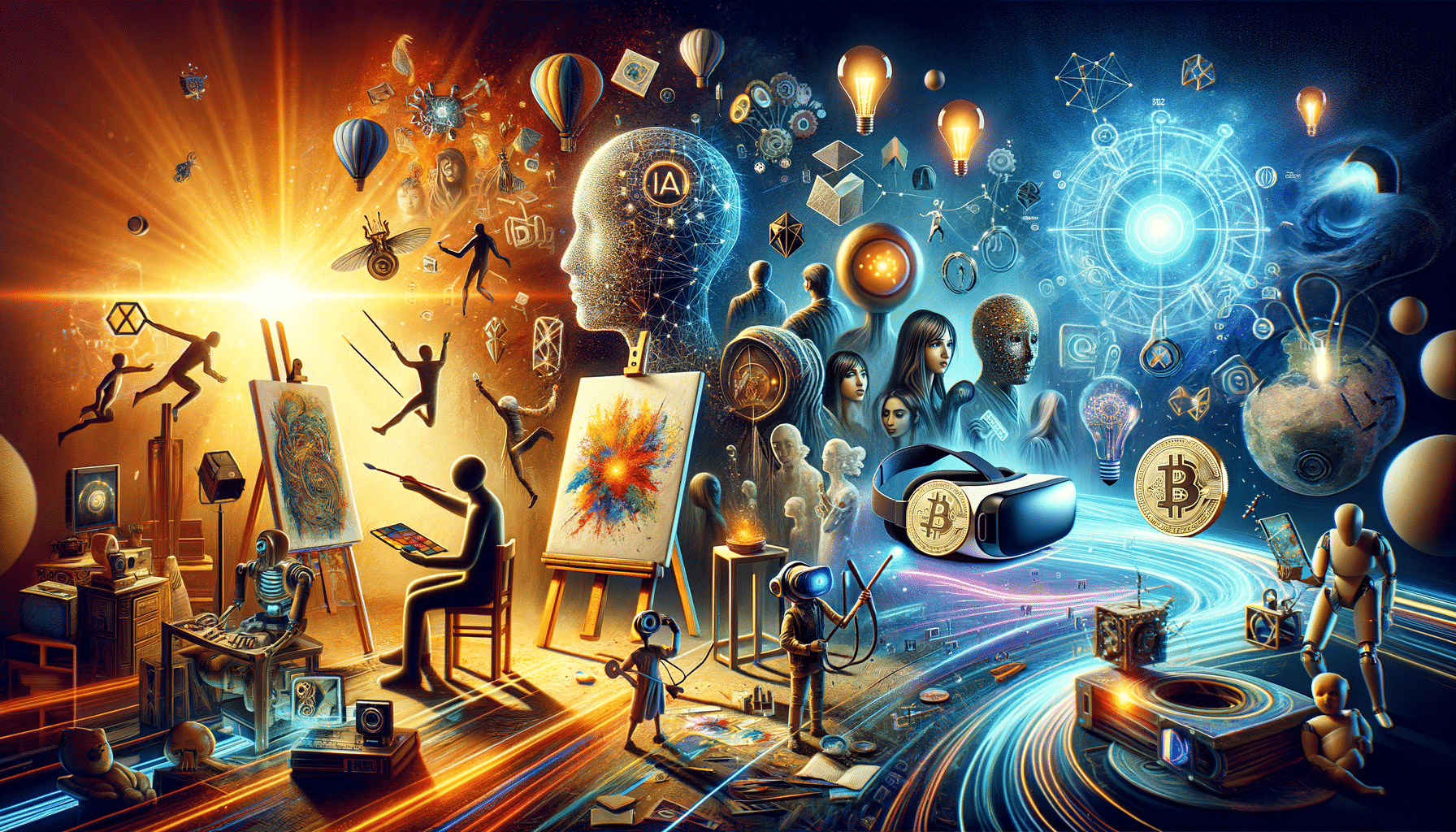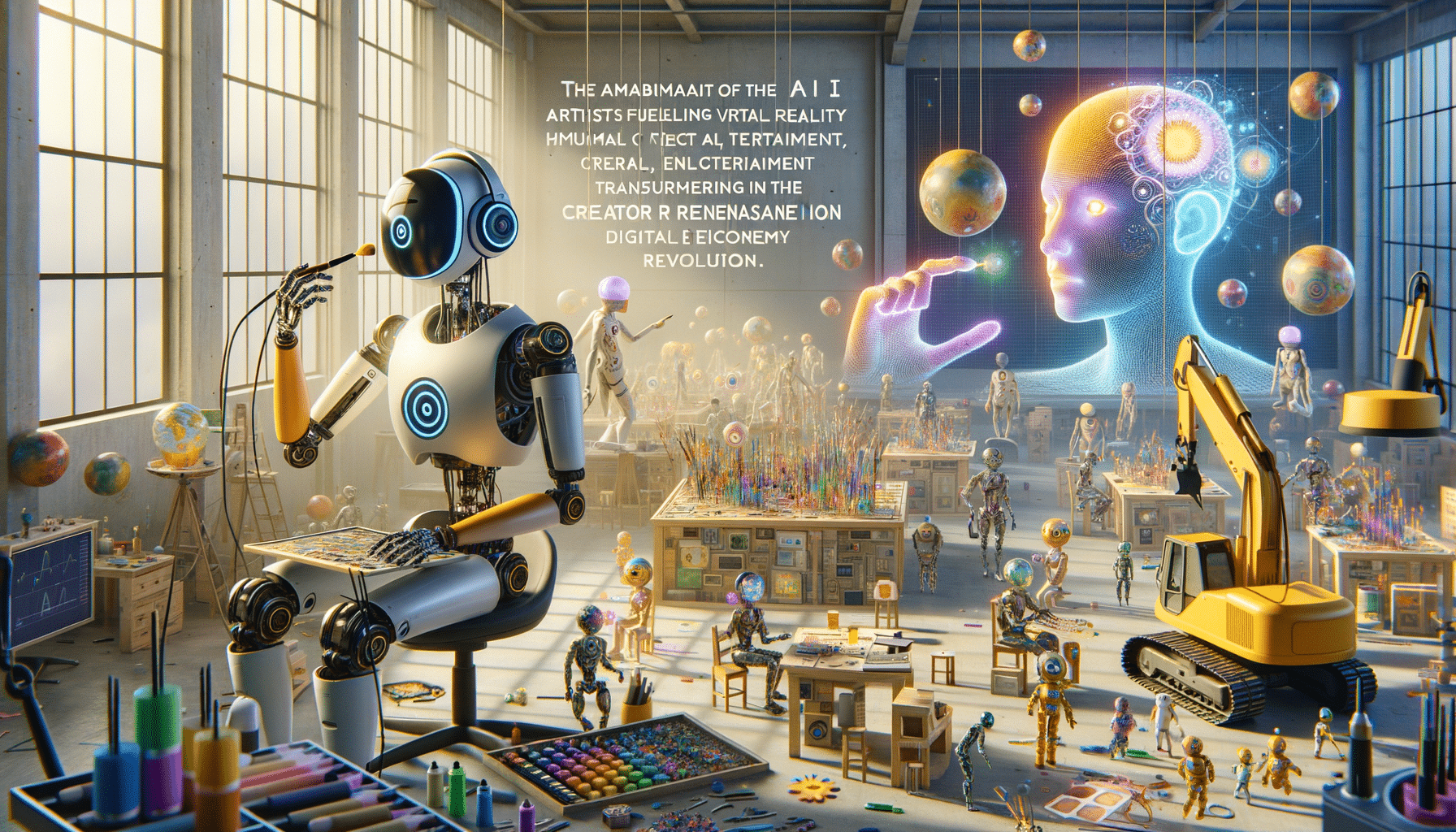
The Digital Renaissance: How Technology is Transforming Arts and Entertainment in 2025
AI Artists and Human Creativity
In the realm of art, artificial intelligence is no longer a distant concept but a present reality that is reshaping the creative process. AI artists have emerged as a new category of creators, producing work that challenges traditional notions of creativity. These AI-generated pieces are not merely imitations of human art but are crafted through complex algorithms capable of learning styles, techniques, and even emotional nuances.
The impact of AI on human creativity is profound. Artists now have the opportunity to collaborate with AI, using it as a tool to expand their creative boundaries. This collaboration allows for the exploration of new artistic styles and the creation of pieces that were previously unimaginable. For instance, AI algorithms can analyze vast amounts of data to generate new musical compositions or visual art styles, offering artists a unique source of inspiration.
However, this technological advancement raises questions about the essence of creativity. Can a machine truly be creative, or is it merely mimicking human ingenuity? The debate continues, but what is clear is that AI is providing artists with new mediums and methods to express their creativity. The integration of AI in art also democratizes creativity, offering tools that enable even those without formal training to create art, thereby broadening the spectrum of artistic expression.
- AI as a collaborator in art creation
- Challenges to traditional notions of creativity
- Democratization of art creation
Virtual Reality Entertainment
Virtual reality (VR) is revolutionizing the entertainment industry by offering immersive experiences that were once the stuff of science fiction. From VR concerts to interactive gaming environments, this technology is transforming how audiences engage with content. The immersive nature of VR allows users to experience events and environments in ways that traditional media cannot replicate.
One of the most significant impacts of VR is seen in live entertainment. VR concerts, for example, enable fans to attend performances from the comfort of their homes while feeling as though they are part of the live audience. This technology breaks down geographical barriers, allowing global audiences to participate in events that were previously inaccessible.
Moreover, VR is enhancing storytelling in films and games. By placing the viewer or player at the center of the action, VR creates a more engaging and interactive narrative experience. This shift not only changes how stories are told but also how they are experienced, offering a level of immersion that deepens emotional connections to the content.
- Immersive VR experiences in entertainment
- Breaking geographical barriers with VR concerts
- Enhanced storytelling through VR
The Creator Economy Revolution
The creator economy is undergoing a revolution, driven by digital platforms that empower individuals to monetize their creativity. This shift has transformed the way content is produced and consumed, with creators gaining unprecedented control over their work and its distribution.
Platforms that support the creator economy provide tools and resources for individuals to build and monetize their personal brands. From video content creators to independent musicians and writers, these platforms offer a direct path to audiences, bypassing traditional gatekeepers in the media industry. This democratization of content creation has led to a diverse array of voices and perspectives being represented in the media landscape.
The rise of the creator economy also reflects changing consumer behaviors. Audiences today seek personalized and authentic content, driving demand for creators who can offer unique and relatable experiences. This demand has led to the growth of niche markets, where creators can thrive by catering to specific interests and communities.
- Empowerment through digital platforms
- Direct audience engagement and monetization
- Growth of niche markets and diverse voices
Technology’s Role in Cultural Expression
Technology is not only transforming how art and entertainment are created and consumed but also how cultural expression is evolving. The digital age has ushered in a new era of cultural exchange, where technology serves as a bridge between different cultures and traditions.
Digital platforms enable artists and creators from diverse backgrounds to share their work with a global audience, fostering a richer and more inclusive cultural dialogue. This exchange is facilitated by social media, streaming services, and online marketplaces, which allow for the dissemination and appreciation of cultural products across borders.
Furthermore, technology has made it possible for cultural heritage to be preserved and celebrated in innovative ways. Virtual museums, for instance, offer access to historical artifacts and exhibitions to anyone with an internet connection, democratizing access to cultural knowledge and education.
- Global cultural exchange through technology
- Preservation of cultural heritage with digital tools
- Inclusive cultural dialogue in the digital age
Conclusion: Embracing the Digital Renaissance
The intersection of technology and creativity is leading us into a digital renaissance, where the possibilities for artistic and cultural expression are boundless. As AI, VR, and the creator economy continue to evolve, they are reshaping the arts and entertainment landscape in ways that were once unimaginable.
This transformation presents both challenges and opportunities. While questions about the nature of creativity and cultural authenticity arise, the potential for innovation and inclusivity in the digital age is immense. By embracing these technological advancements, artists, creators, and audiences alike can participate in a vibrant and dynamic cultural ecosystem that reflects the diversity and richness of human expression.
As we navigate this digital renaissance, it is crucial to foster an environment that supports creativity, encourages collaboration, and celebrates the unique contributions of each individual. The future of arts and entertainment is bright, and with technology as our ally, we are poised to explore new horizons of cultural expression.
- Challenges and opportunities in the digital age
- Fostering creativity and collaboration
- Exploring new horizons of cultural expression
